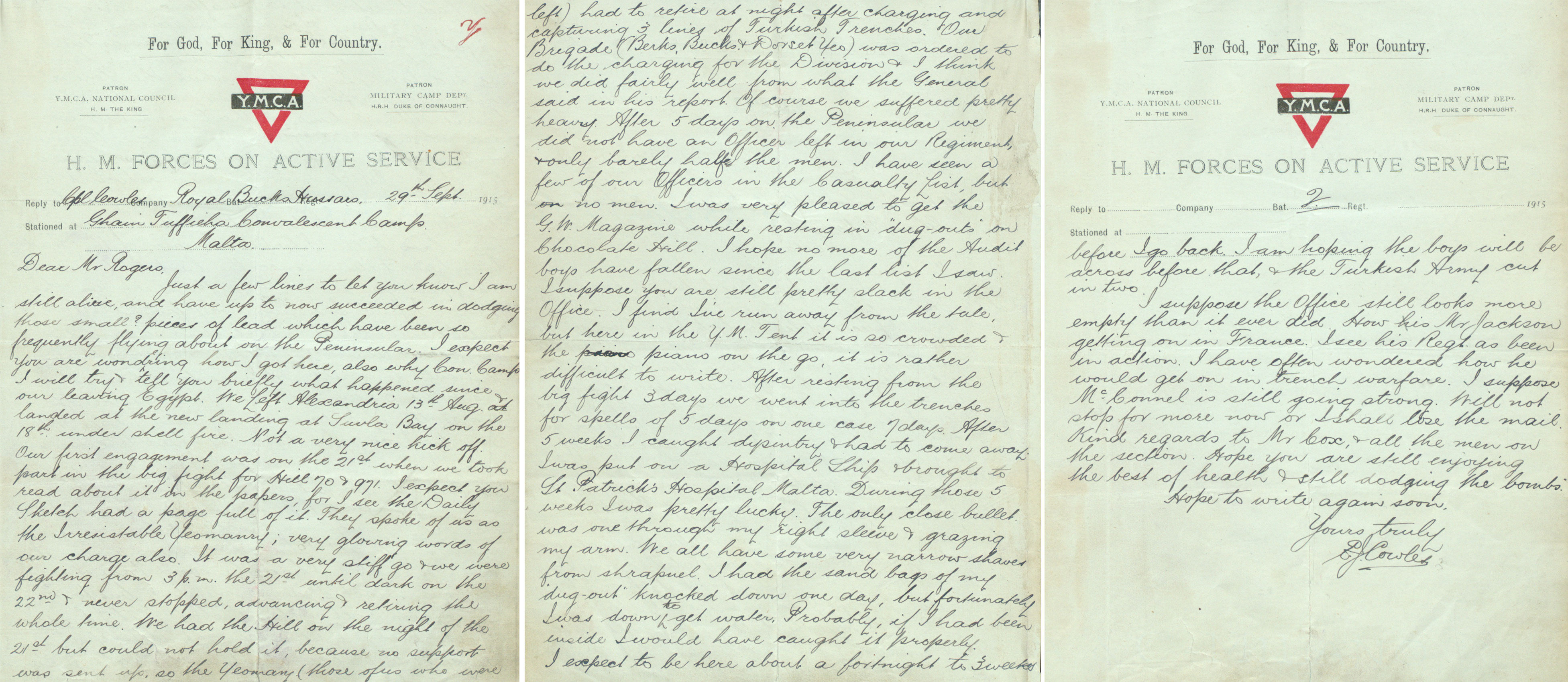
This is one of many letters sent by staff of the Great Western Railway (GWR) Audit office at Paddington who had enlisted to fight in the First World War. (RAIL 253/516)
Ernest John Cowles, 29 September 1915, Malta. Born: 8 August 1893, Joined GWR: 29 June 1903, Regiment: Royal Buckinghamshire Hussars; Royal Army Medical Corps, Regiment number: 713; 434085, Rank: Corporal, Died: 1967
Transcript
Dear Mr Rogers,
Just a few lines to let you know I am still alive and have up to now succeeded in dodging those small pieces of lead which have been so frequently flying about the Peninsular [Dardanelles]. I expect you are wondering how I got here, also why Con. [convalescent] Camp. I will try and tell you briefly what happened since our leaving Egypt. We left Alexandria 13th August and landed at the new landing at Sulva Bay on the 18th under shell fire. Not a very nice kick off. Our first engagement was on the 21st when we took part in the big fight for Hill 70 and 971. I expect you read about it in the papers, for I see the Daily Sketch had a page full of it. They spoke of us as the Irresistable Yeomanry; very glowing words of our charge also. It was a very stiff go and we were fighting from 3pm the 21st until dark on the 22nd and never stopped advancing and retiring the whole time. We had the Hill on the night of the 21st but could not hold it, because no support was sent up, so the Yeomanry (those of us who were left) had to retire at night after charging and capturing three lines of Turkish trenches. Our Brigade (Berkshire, Buckinghamshire and Dorset Yeomanry) was ordered to do the charging for the Division and I think we did fairly well from what the General said in his report. Of course we suffered pretty heavy. After five days on the Peninsular we did not have an Officer left in our regiment, and only barely half the men. I have seen a few of our Officers in the casualty list, but no men. I was very pleased to get the GRW Magazine while resting in dugouts on Chocolate Hill. I hope no more of the Audit boys have fallen since the last I saw. I suppose you are still pretty slack in the office. I find I’ve run away from the tale, but here in the Y.M.C.A. tent it is so crowded and the piano on the go, it is rather difficult to write. After resting from the big fight three days we went into the trenches for spells of five days, on one case seven days. After five weeks I caught dysentery and had to come away. I was put on a hospital ship and brought to St. Patrick’s Hospital, Malta. During those five weeks I was pretty lucky. The only close bullet was one through my right sleeve and grazing my arm. We all have some very narrow shaves from shrapnel. I had the sandbags of my dugout knocked down one day, but fortunately I was down to get water. Probably, if I had been inside I would have caught it properly. I expect to be here about a fortnight to three weeks before I go back. I am hoping the boys will be across before that, and the Turkish army cut in two.
I suppose the office still looks more empty than it ever did. How is Mr Jackson getting on in France? I see his regiment has been in action. I have often wondered how he would get on in trench warfare. I suppose McConnel is still going strong. Will not stop for more now as I shall lose the mail. Kind regards to Mr Cox and all the men on the section. Hope you are still enjoying the best of health and still dodging the bombs. Hope to write again soon. Yours truly,
E.J. Cowles.
